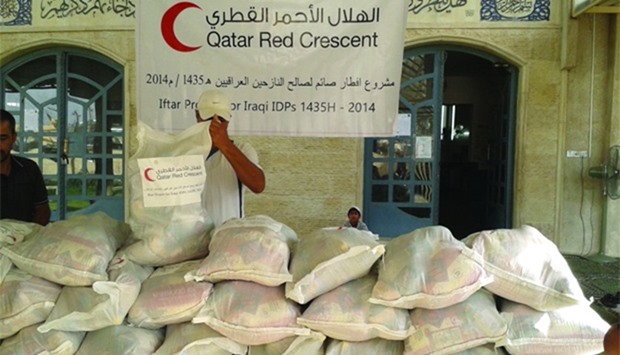In doing so, QRCS has cited its international capacity as a neutral humanitarian organisation trusted by local and global partners, mainly the United Nations Children’s Fund (Unicef) and the Iraqi Red Crescent Society (IRCS).
In 2013, QRCS established a representative office in Erbil, northern Iraq, which is registered with the Bureau of Non-government Organisations of the Kurdistan government.
As a large number of Iraqis were displaced by the escalating violence, QRCS co-ordinated with local partners to assess needs across the board. In the face of severe shortages in drinking water and sanitation services, QRCS and Unicef worked together to provide drinking water, toilets and hygiene campaigns both within and outside camps in Erbil and Sulaymaniyah in order to cover the families settled at schools, mosques and public parks.
In Mosul, where the unrest affected thousands of lives with the beginning of Ramadan 2014, QRCS distributed 20kg food packages to 1,980 families, in co-operation with the Social Solidarity Charitable Society at a cost of $73,000.
In Ramadan 2015, $87,000 food packages were distributed to the poorest Syrian and Iraqi families in Al Anbar, Baghdad, Saladin, Kirkuk and Kurdistan.
Under the Warm Winter Programme 2014-2015, QRCS delivered $219,178 worth of blankets to 5,088 families (25,440 people) in Mosul, Al Anbar, Amiriyah Fallujah, Baghdad and the Ramadi outskirts, Diyala, Halabja and the desert area between Hit and Ar Rutbah, Al Anbar.
In the January-March 2016 period, QRCS distributed $500,000 worth of blankets to 4,575 families (27,450 people) in Erbil, Sulaymaniyah, Mosul, Al Anbar and Baghdad, in partnership with IRCS, Alamal Almanshood Organisation, and with the Social Solidarity Charitable Society.
In June 2015, QRCS initiated a project to lay a drinking water network at the Ashti IDP camp to serve more than 7,000 Iraqi families. The $1,775,000 project is set to complete in June 2016.
“QRCS is firmly committed to helping displaced Syrians everywhere, including Kurdistan, which hosts more than 223,000 refugees,” the organisation said in a statement.
QRCS had inked an agreement with Unicef to buy and instal 500 solar water heaters to serve the 10,000-odd population of the Dar Shukran refugee camp, as well as covering the camp’s school, clinic and administrative units.
At the Arbat refugee camp, QRCS and Unicef built a drinking water network in blocks A, B and C to provide clean water for 10,000 Syrians.
The total cost of the above works in Dar Shukran and Arbat was $1,050,000.
Finally, at the Qushtapa refugee camp, QRCS and Unicef built an integrated sewerage system to serve 1,920 Syrians in Block C, in addition to 728 sanitary facilities and 24 20cubic-metre water tanks.
These works cost $1,288,758, while the second phase of water and sewage system is in progress at a cost of $750,000, to be completed by the end of April.

